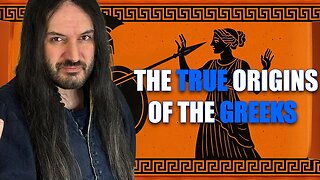Premium Only Content

Episode 3303: The Camel enters the Tent: Small Compromises Invited the Great Apostasy
November 23, 2025
www.catholic-reboot.com
Nightly Zoom Coordinates for Rosary:
Meeting ID: 865 8978 0399
Passcode: Wjjv4960!
Speak Lord for your Servant is Listening
Book Recommendation of the Day
The Spiritual Combat — by Dom Lorenzo Scupoli (recommended by St. Francis de Sales)
(A manual on how Satan gains ground inch by inch)
Not a canonized saint, but the book was endorsed as spiritually foundational by St. Francis de Sales who carried it for 18 years.
Why it matches:
• Shows how the devil always begins with tiny concessions
• Warns against the “first small opening” to sin
• Explains the strategy of interior infiltration of the soul
This is essentially the camel-and-tent parable in spiritual form.
“The Camel at the Door: How Small Compromises Invited the Great Apostasy”
We begin with one of the most deceptively simple stories ever told the story of the camel and the tent.
It sounds harmless.
It sounds innocent.
It sounds like a tale for children.
But spiritually, it contains a devastating warning:
Evil rarely enters by force. It enters by permission.
Not through the front door, but through the crack you didn’t think mattered.
Saints, popes, mystics, and Church Fathers all repeat the same theme:
• Satan requires only a small opening.
• Error spreads slowly almost gently before it destroys.
• A civilization collapses one small compromise at a time.
• The Church is infiltrated not in one moment, but over decades of “harmless” concessions.
St. Francis de Sales wrote:
“Small faults are like little worms that hollow out great trees.”
St. Pius X warned that the modernists would begin:
“with mild language, gentle presence, and apparent piety… and end by corrupting the entire Faith.”
This ancient folktale foreshadows everything we have lived through since the late 19th century, climaxing in the catastrophic modernist revolution after Vatican II.
Today, we will walk through this parable step by step
and apply it to the great apostasy unfolding before our eyes.
THE PARABLE OF THE CAMEL AND THE TENT
A man was resting inside his tent on a cold desert night.
His camel stood outside, shivering.
Softly the camel pleaded:
“Master, may I put just my nose inside the tent? Only my nose.”
The man felt pity.
What harm could it do?
He opened the flap slightly.
A moment later:
“Master, may I put my head inside too?”
Then the neck.
Then the shoulders.
Then the hump.
Then the entire body.
By dawn, the camel was inside
and the man was pushed out into the freezing night.
This is exactly how temptation works.
This is exactly how modernism entered the Church.
This is exactly how apostasy has taken hold of the once-Catholic world.
SECTION I — SMALL COMPROMISES ALWAYS LEAD TO GREAT COLLAPSES
St. Alphonsus Liguori said:
“The devil does not begin by tempting to grave sin.
He asks only for a small opening.”
Look at the spiritual pattern:
• A small sin tolerated becomes a habit
• A small doctrinal ambiguity becomes a revolution
• A small relaxation of discipline becomes outright disorder
• A small liturgical novelty becomes liturgical ruin
• A small openness to the world becomes worldliness ruling the Church
The camel’s nose is always small:
• “Just a little immodesty.”
• “Just a small change to the liturgy.”
• “Just dialogue with the world.”
• “Just a little tolerance of error.”
• “Just a small pastoral accommodation.”
But each small concession makes the next one easier.
And eventually, the whole tent is full.
The soul is displaced.
The Faith is replaced.
Christ is pushed out.
This principle explains the entire crisis of the modern Church.
SECTION II — HOW THE MODERN CHURCH LET THE CAMEL IN
Here we apply the parable directly.
1. The Nose: “Let’s soften the language of the Faith.”
Late 1800s to early 1900s
“Let’s avoid harsh words like ‘sin,’ ‘hell,’ or ‘heresy.’”
Harmless?
No.
This was the first opening.
St. Pius X recognized this tactic in Pascendi:
“They begin by lending an appearance of piety to their errors…”
2. The Head: “Let’s be friendly with the world.”
“Let’s work with secularists.”
“Let’s speak their language.”
“Let’s remove anything that feels ‘rigid.’”
Soon worldliness seeped into seminaries, catechesis, and parishes.
3. The Neck: “Let’s change the emphasis of the liturgy.”
Before Vatican II:
• “We’re just adding more ‘participation.’”
• “We’re just reducing Latin a little.”
• “We’re just experimenting.”
The camel’s neck entered the tent.
4. The Hump: “Let’s rewrite the Mass.”
1960s–1970s:
• Altar rails removed
• Altars flipped
• Communion in the hand
• Laity replacing clerical roles
• Gregorian chant cast aside
• Sacrificial language removed
This was not the camel’s nose anymore.
It was the hump.
5. The Full Body: “Let’s change the Church to fit the modern world.”
Now we see:
• Bishops promoting secular ideology
• Confusion about marriage, sexuality, and identity
• Liturgical chaos
• Doctrinal ambiguity
• Ecumenism that dissolves Catholic identity
• A Church afraid to speak with authority
• A moral collapse in Catholic institutions
Just as in the parable, the camel has taken over the tent.
The man symbolizing Christ and His faithful is outside.
And the cold night represents the spiritual desolation engulfing the world.
SECTION III — THE SAINTS WARNED THIS WOULD HAPPEN
St. Anthony the Great foresaw our time:
“A time is coming when men will go mad,
and when they see someone who is not mad,
they will attack him saying:
‘You are mad because you are not like us.’”
St. John Vianney:
“The devil only wins when we stop resisting.”
St. Pius X:
“Modernists lay the axe to the very root of the Faith.”
This is not new.
We were warned.
But the shepherds ignored the warnings
and now the flock suffers.
SECTION IV — HOW TO DRIVE THE CAMEL OUT OF THE TENT
This is the heart of your episode practical, powerful, traditional.
1. Reject small compromises
Every temptation begins small.
Resist immediately.
2. Protect the doors of the senses
Guard:
• what you watch
• what you read
• what you listen to
• whom you spend time with
The camel enters through the eyes and ears.
3. Cling to Tradition
Traditional doctrine, traditional morality, and the Traditional Latin Mass are the tent stakes holding the structure firm.
4. Restore discipline
Without discipline:
• families collapse
• vocations collapse
• parishes collapse
• societies collapse
5. Consecrate your home
Place your tent under the Kingship of Christ:
• Enthronement of the Sacred Heart
• Daily Rosary
• Holy Water at doors
• Confession at least monthly
• First Fridays & First Saturdays
6. Live the Catholic Faith visibly and unapologetically
Do everything the modern world fears:
• Speak truth clearly
• Refuse error calmly
• Reject compromise firmly
• Live purity joyfully
• Be rooted in Catholic identity faithfully
This is how you rebuild the tent from the inside out.
CONCLUSION
The camel and the tent is not just a folktale.
It is the story of:
• our culture,
• our families,
• our parishes,
• and our own souls.
The devil rarely begins by roaring.
He whispers.
He suggests.
He negotiates.
He appeals to compassion, tolerance, and modernity.
But every time we open the flap of the tent a little,
he pushes further inside.
Yet the Good News is this:
Christ still owns the tent.
He alone can drive out the camel.
He alone can restore His Church.
He alone can purify His faithful.
Our job is simple:
• Refuse compromise.
• Live the Tradition.
• Guard the door.
• Stay faithful.
For if we guard the small things,
God will guard the great ones.
The Epistle — Colossians 1:9–14
"That you may be filled with the knowledge of His will, in all wisdom and spiritual understanding."
St. Paul writes to the Colossians with the heart of a father, interceding for them, desiring that they know God’s will with spiritual clarity.
In an age of confusion—much like ours—Paul reminds us:
1. True knowledge begins with God’s will, not man’s imagination.
Modernism claims that truth evolves.
The Church teaches that truth is revealed, not invented.
St. Paul’s prayer is the antidote:
“Be filled with the knowledge of His will.”
Not the world’s will.
Not our own preferences.
But His.
2. Spiritual understanding must lead to a worthy life.
Paul tells us to “walk worthy of the Lord,” bearing fruit in every good work.
A Catholic cannot separate faith from conduct.
The crisis in our times has come precisely because many tried to separate the two.
3. Strength comes from God alone.
"Strengthened with all might according to His glorious power."
We are not expected to endure the collapse of the culture or the confusion in the Church by our own strength.
The saints persevered because God strengthened them.
4. We have been delivered from darkness.
This line is especially striking:
“Who hath delivered us from the power of darkness and translated us into the kingdom of His beloved Son.”
This is not poetic imagery.
It is metaphysical reality.
There are only two kingdoms:
• The kingdom of Christ
• The kingdom of darkness
Every choice moral, liturgical, doctrinal moves a soul toward one or the other.
For those striving to live the traditional Catholic faith in an age of apostasy, Paul’s words give courage.
We have been rescued.
We have been delivered.
Therefore, we must not live as slaves of darkness, nor dwell in fear, nor follow false shepherds but walk in the brilliant light of Christ the King.
EPISODE SEGMENT 2: Feast of St. Clement I — Pope and Martyr
Today we also honor St. Clement I, the fourth pope after St. Peter.
Clement lived during violent persecutions.
He restored order in the Early Church when factions arose.
He wrote his famous Letter to the Corinthians, urging unity based on apostolic tradition, not personal opinion.
He reminded the faithful that:
• Church hierarchy is divinely instituted
• Obedience to truth is necessary
• Tradition must be preserved
• Charity cannot be separated from doctrine
• Suffering for Christ is a privilege
In the end, Clement sealed his teachings with his blood, being cast into the sea with an anchor around his neck.
His life tells us something vital:
Every true Catholic renewal in history begins with returning to Tradition and holding fast to the faith handed down from the Apostles.
Clement lived through apostasy, upheaval, and persecution—just as we do now.
And like him, we must root ourselves in the unchanging truths of Christ.
________________________________________
EPISODE SEGMENT 3: The Gospel — Matthew 24:15–35
"Heaven and earth will pass away, but My words will not pass away."
This Gospel is powerful, sobering, and extraordinarily relevant.
Our Lord speaks of the abomination of desolation, drawing from the prophet Daniel. Traditionally, the Fathers interpret this as:
• A desecration of the holy
• A distortion of worship
• A crisis within the people of God themselves
Sound familiar?
Jesus describes a time of deception so great that many—even the elect could be misled.
He warns of false prophets, false signs, false movements even false “christs.”
This passage is not meant to frighten; it is meant to awaken.
Let us consider three key themes:
1. The Crisis Within the Temple
Jesus locates the crisis in the holy place—the sanctuary, the sacred sphere.
In our day, we see confusion, abuses, and distortions even within the Church’s liturgy and doctrine.
The Gospel teaches:
When the sacred is distorted, flee to what is true.
Return to the unchanging faith.
Return to reverent worship.
Return to the Tradition that sanctified the saints.
2. The Shortening of the Days
"Unless those days had been shortened, no flesh would be saved."
This shows the mercy of God even in chastisement.
He will not permit evil to triumph completely.
He intervenes for the elect.
3. Christ’s Words Cannot Fail
This Gospel ends with one of the most consoling declarations in all Scripture:
“My words shall not pass away.”
Empires will fall.
Nations will disappear.
Cultures will collapse.
Even “renewal movements” in the Church will rise and fade.
But the words of Christ, handed down through Apostolic Tradition, remain unshakeable.
This is why the Traditional Latin Mass, traditional doctrine, and fidelity to the perennial Magisterium are not optional preferences.
They are the sure foundation that Christ promised would endure until the end.
EPISODE SEGMENT 4: Applying These Readings Today
The Epistle strengthens us.
The Gospel warns us.
St. Clement inspires us.
Together they speak directly to Catholics living today:
• We must grow in true knowledge—not the counterfeit wisdom of modernity.
• We must cling to the Church’s Tradition—not passing theological trends.
• We must stay awake—not lulled into complacency by the spirit of the age.
• We must persevere—not by our strength, but by God’s grace.
• We must expect suffering—but see it as participation in Christ’s victory.
Above all, these readings assure us:
Christ is still King.
His Church still stands.
His saints still intercede.
His victory is certain.
________________________________________
CONCLUSIONARY PRAYER
Let us close in prayer.
In the Name of the Father, and of the Son, and of the Holy Ghost. Amen.
O Lord Jesus Christ, King of all creation,
strengthen us with the might of Your glorious power,
that we may walk worthy of You in all things.
Fill our hearts with the light of true wisdom
and deliver us from every deception of the enemy.
Through the intercession of St. Clement I,
give us courage to stand firm in the Apostolic Faith
and to persevere joyfully in the midst of trials.
Grant that in these uncertain times
we may cling to Your unchanging Word
and remain faithful until the day of Your glorious return.
O Mary, Mother of the Church,
keep us under your mantle
as we journey through this valley of tears
toward the triumph of your Son.
In the Name of the Father, and of the Son, and of the Holy Ghost. Amen.
-
 LIVE
LIVE
TimcastIRL
1 hour agoClinton Judge JUST DISMISSED James, Comey Indictment, Trump DOJ APPEALS | Timcast IRL
23,099 watching -
 LIVE
LIVE
SpartakusLIVE
7 minutes agoCreator House LIVE STREAM || ASSUAGING the RAGE of viewers by streaming DEEP into the Night
92 watching -
 17:37
17:37
MetatronHistory
19 hours agoThe REAL Origins of the GREEKS
1212 -
 LIVE
LIVE
Drew Hernandez
19 hours agoBONDI DOJ BLOWS IT ON COMEY/LETICIA INDICTMENTS?!
646 watching -
 12:10
12:10
Robbi On The Record
23 hours ago $0.40 earnedKarmic Disclosure and Predictive Programming
4042 -
 46:09
46:09
MattMorseTV
2 hours ago $12.61 earned🔴Bondi just DROPPED the BALL... BIG TIME.🔴
8.69K55 -
 23:57
23:57
Jasmin Laine
5 hours agoCarney SNAPS at Reporters—MOCKS Trump and it BACKFIRES IMMEDIATELY
4.06K14 -
 LIVE
LIVE
Sarah Westall
2 hours agoDo Near Death Experiences Provide a Glimpse into Reality? w/ Darius Wright
207 watching -
 49:36
49:36
Barry Cunningham
3 hours agoMUST SEE: PAM BONDI AND KAROLINE LEAVITT MAKE REMARKS! | AND MORE NEWS!
92.4K21 -
 41:11
41:11
Donald Trump Jr.
22 hours agoMaking America Affordable Again, Interview with Economist Steve Moore | TRIGGERED Ep.294
119K95